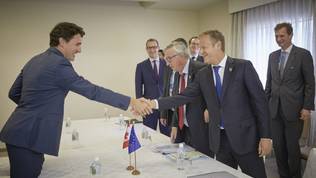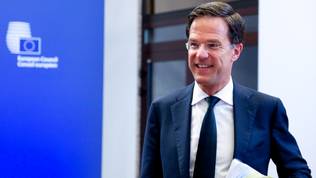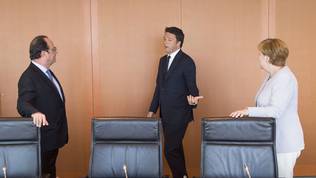NOVANEWS
Adelina Marini
The thing that got a little neglected at the June EU summit because of the referendum in Great Britain and the migrant crisis in the EU was the taking away (or perhaps the return) of powers from the European Commission in the negotiations of trading policies with third countries. At that point, member states insisted that the approval of the trade agreement with Canada (one of the most certain ones) is not performed solely by the European Commission and the Council, but by national parliaments as well. This was the reason for the famous statement by the Canadian Trade Minister Chrystia Freeland: “If the EU cannot do a deal with Canada, I think it is legitimate to say who the heck can it do a deal with”, she said point blank in the beginning of June.
The return of national sovereignty over trade policy, which happened somehow unnoticed together with the referendum in Great Britain, now also has its consequences – a regional parliament in Belgium rejected the deal, which blocked it completely. The subject will be one of the main issues on the agenda of the October EU summit, which begins on Thursday. European Council President Donald Tusk (Poland, EPP) placed the subject second on the leaders’ agenda for the first day. Discussion on this subject will proceed along two lines. The first one will be finding a solution together with Belgium on how to overcome the veto of the Walonia regional parliament, and the second one will be a more general discussion on a change of the Union’s trade policy.
According to the team of President Tusk, there is way too much ideology in the debate on the Union’s international trade policy, while actually there needs to be more pragmatism. The solution is regaining the trust of EU citizens that trade policy on the European level has the one and only purpose of protecting the people’s interest. The discussion will continue on Friday as well, when the leaders will discuss trade defence mechanisms in the event of unfair trade practises. The focus of the summit will be free but fair trade. “For trade to be free, it needs to be fair. The European Council will therefore discuss the modernisation of trade defence instruments and our ongoing negotiations of free trade agreements with key partners”, is said in the invitation letter of Donald Tusk to leaders.
He does not expect to achieve consensus at this summit, but hopes that everyone agrees that the negotiations on these instruments at the ministers’ level cannot go on for three more years.
There will be one more subject at the summit this week, which demonstrates a clash between national sovereignty and the common European interest. The Dutch Prime Minister is expected to discuss with his colleagues the possibilities for overcoming the result of the April referendum in the Netherlands, when the majority of voters denounced the ratification of the comprehensive trade agreement with Ukraine. The options are not at all favourable for the integrity of the Union and the future of Ukraine, which is locked in a heavy geopolitical conflict with Russia. According to The Financial Times, Prime Minister Mark Rutte needs several key concessions in order to secure the ratification by the Dutch parliament. Among them are the military relations between the EU and Ukraine, the future EU membership of Ukraine, and guarantees that no money of the Dutch taxpayers will be sent to Kiev under any circumstances.
These requests are too many and too important to be easily swallowed by the other 27 member states, which have already ratified the agreement, further to military cooperation being so important for the Baltic States, Poland, and other countries, providing the possibility for adequate resistance against Russian aggression.
And the reason behind all of the reinstatement of national sovereignty over common European issues – the Brexit – will be touched on during the summit, but not much attention will be paid to it. For British PM Theresa May this will be a debut in European Council summits. According to high-ranking diplomatic sources, however, the British problems will not be at the centre of attention. Leaders expect Mrs May to officially announce her intention to trigger Article 50 of the Treaty for the EU in March of next year, which will give the start of the negotiations on the exit of the United Kingdom. Leaders are expected to turn a deaf ear to all other issues, exactly like they were doing for years to David Cameron’s until the date of the referendum approached.
Russia – the consolidator of the EU?
Despite it being such a paradox, the only subject that so far succeeds in unifying the EU is Russia. For the first time relations with this country are going to be the leading subject of a summit, and with no need for making a decision on continuation or broadening the scope of sanctions. The expectations of President Tusk are for the discussion to be wide and deep, expecting the focus to fall on Ukraine and Russia’s role in the war in Syria. There will be no decisions made on this subject, which is going to be served at dinner on Thursday evening. Decisions are expected to be made at the December European Council summit. According to The Financial Times, it is expected that the issue of financing extreme parties within the European Union will be raised, but it is not set as a subject on the agenda. It will be open for discussions, should a member state raise the question. Tusk himself has no intention of raising it.
Following the illegal annexation of the Ukrainian Crimea peninsula and the achieving of a difficult European unity on imposing sanctions on Russia, this unity has begun shaking badly. The Russian intervention in Syria, however, once again united member states, which for the first time hardened the tone towards Russia in the conclusions of foreign ministers from Monday. They will be presented by the High Representative of the European Union for Foreign Affairs Federica Mogherini, but there are separate conclusions expected to be drafted by the leaders on this subject.
Saving Private Renzi
The first point on the agenda is the migrant crisis. As was explained by a high-placed source in the EU, this is not another emergency summit on the subject, because numbers are looking good. The inflow of refugees has dropped by 98% along the Eastern Mediterranean route. This is why the focus will be on the Central Mediterranean route, where the number of migrants is the same as was over the last two years. The subject, however, is important, for it will allow the EU to satisfy at least one of the demands of Italian Prime Minister Matteo Renzi, whose fate depends on the strategic December referendum in Italy on Mr Renzi’s large political reform. Despite the reform being important, the vote looks like it is going to be a vote of no confidence for the government of the Italian Prime Minister. This is why he desperately needs a victory at the European front at least.
Matteo Renzi insists on fiscal rules being stretched even more, so his accounts can balance on the national level, but after this year’s decision for sanctioning Spain and Portugal for systemic non-compliance with EU budgeting rules, the Commission will find it almost impossible to come up with argumentation for giving Matteo Renzi one more chance. Thus, the only option left for appeasing him is accepting his idea for creating migration compacts. His proposal dates back to last spring and some of the ideas in it were adopted by the EC. It is expected that leaders will discuss it in more detail during the Thursday summit. Renzi’s proposal included the EU proposing investment projects with high social and infrastructure impact to migrant source countries.
Another idea of his is the creation of special EU-Africa bonds to ease the access of African countries to EU capital markets. The proposal also included the creation of quotas for third country workers, resettlement schemes, and common migration bonds. All of these are subjects, opposed by the Visegrad
Four countries, especially Hungary.
Although there will for sure be heated discussions on this subject, it is not expected that the question of the Hungarian referendum will be raised.
Enough talking!
The big piece of news at the October Council this year will be the report on the implementation of the adopted decisions. The rotating Council Presidency, which is now in the hands of Slovakia, will report on the implementation of the tasks, which the leaders of the 27 member states (excluding Great Britain) set at the informal summit in Bratislava. Among the subjects that will be reported on by Slovak PM Robert Fico are the entering into force of the Paris climate agreement and the creation of the European Border and Coast agency. It would be well if this report does not boil down to just the roadmap from Bratislava, but it also encompasses all commitments, made by the leaders at their official summits as well.






